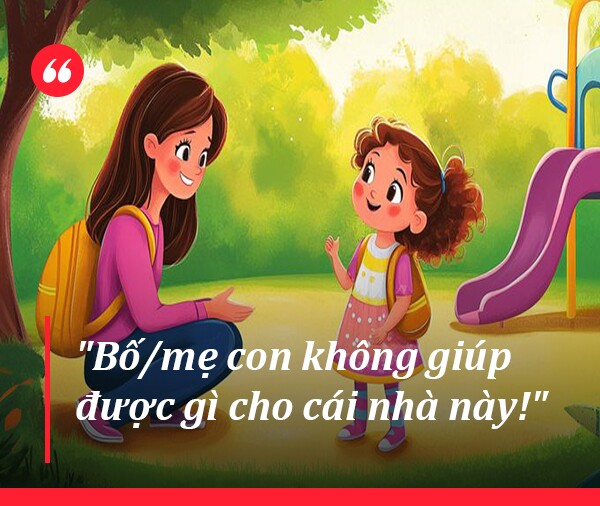Children often look to their parents as role models, and the way parents express their thoughts and emotions will deeply impact how children understand and interact with the world. Therefore, in any case, parents should refrain from saying the following three statements to their children.

“Parents will sacrifice everything for their children”
Many parents often say things like, “If it weren’t for you, we would have divorced a long time ago” or “We sacrifice everything for you” or “To provide for your education, we don’t even buy new clothes for ourselves.” While these statements may sound like expressions of deep love, they unconsciously place a heavy burden on the child’s shoulders.
Children may feel that they are the reason for their parents’ sacrifices and thus develop a sense of guilt or an overwhelming sense of responsibility for their parents’ lives.
The feeling of having to “repay” their parents’ love can lead to unnecessary worries and negatively impact their psychological development.

True love should not be based on sacrificial bargaining but should be a source of encouragement, motivation, and comfort. Children need to feel warmth and support, not a burden for the decisions of their parents. Instead of focusing on sacrifices, parents should praise their children’s progress and achievements. Positive encouragement will help boost their confidence in personal development.
By doing so, the parent-child relationship will become more comfortable. Open and honest conversations can help children understand that love is not just about sacrifices but also about mutual understanding and respect.

“I can’t do anything right for this family!”
Sometimes, parents vent their frustrations, unintentionally dragging their children into the family’s conflicts. When parents complain about or criticize each other in front of their children, it makes them feel uncomfortable and confused about whom to side with.
Children are highly sensitive to their parents’ emotions. Hearing criticisms, complaints, or arguments between parents can make them feel insecure. Children should not have to bear the emotional burdens created by adults.

In this case, psychological experts advise parents to leave family issues in the past. If not, children may carry these emotions into their adult lives.
Childhood experiences form the foundation for future psychological issues, such as trust issues or difficulties in establishing healthy relationships. By letting go of past conflicts and focusing on creating a positive family environment, parents help their children grow up healthy and confident while strengthening family bonds.

“You must get the highest score in this exam!”
Statements like this often stem from parents’ high expectations and create pressure for their children.
When children feel that academic performance is the only way to please their parents, they may become anxious and fearful during exams.
Every child has dreams, no matter how bizarre, and these dreams deserve respect. Parents want the best for their children but often overlook the power of language. The words used daily can either motivate or hinder their development.
When children feel supported, they gain the confidence to pursue their dreams, no matter how difficult the journey may be.

Instead of focusing on results, encourage your children in their efforts. Ask them about their learning experiences and the challenges they’ve overcome. This approach fosters a comfortable learning environment where children focus not only on grades but also on skill development and critical thinking.
Replace complaints with encouragement and accusations with support. When parents demonstrate understanding and patience, the parent-child relationship becomes smoother. Children’s happiness begins when parents choose to remain silent on certain issues.
A safe and nurturing environment allows children to freely express themselves and share their dreams and worries with their parents. This strengthens family bonds and creates deeper connections between family members.
With support and love, children gain the confidence to pursue their dreams without fearing failure.





































